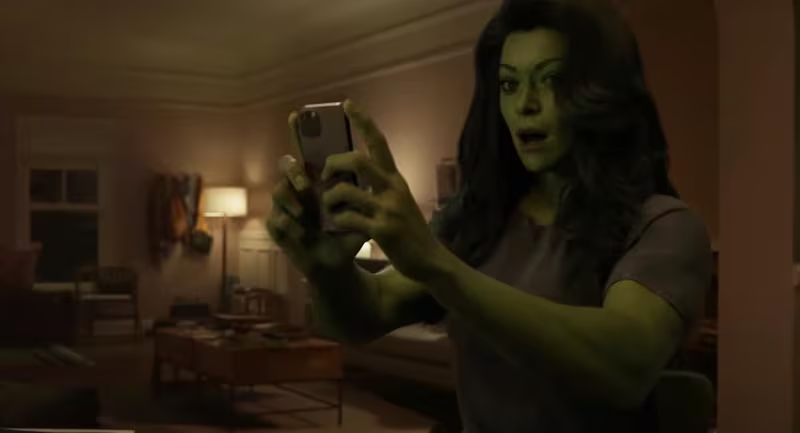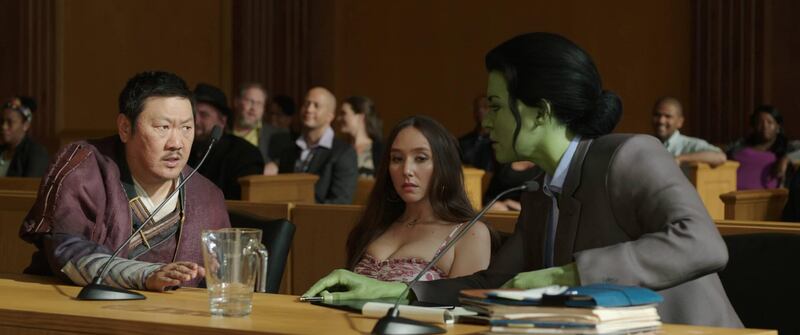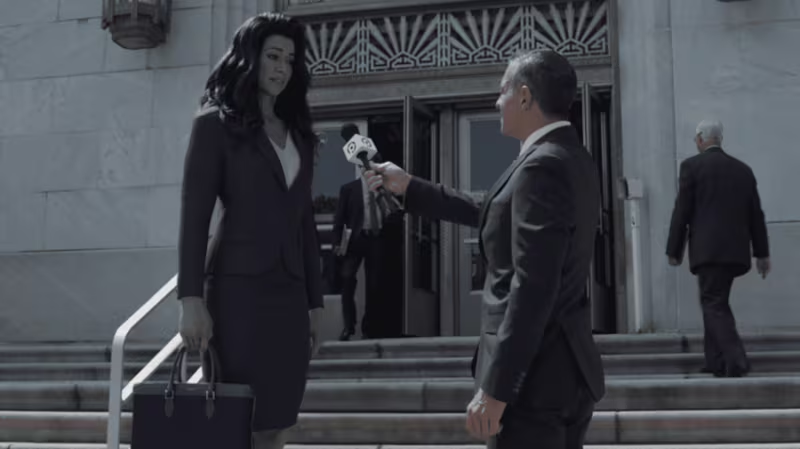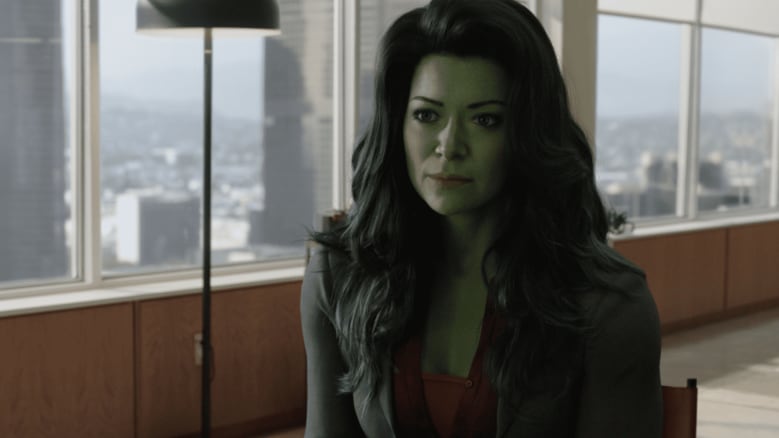Do you remember the sexy vampires of the 1990s? The kind of vampires that put too much gel in their hair and made out with Sarah Michelle Gellar? I started thinking about them while watching She-Hulk: Attorney at Law (and apropos of the season, I suppose), because I used to wonder why anyone wouldn’t want to be a soulless bloodsucker when they look like that.
Now, however, I understand that being soulless and without heart isn’t as leather-clad and hot as the ’90s made it out to be. Instead, it looks a lot like She-Hulk: Attorney at Law.
Early teasers for the Disney+ show suggested She-Hulk might be something different. It seemed like Marvel was going all in on the comic-book campiness that normally lives on the margins of its productions. But after its recently concluded nine-episode run, it turns out that She-Hulk is just more of the same.
This is despite how much the finale, with its meta nonsense, wants us to believe it’s all deliberate—that its confused tone was really one big “gotcha.” I simply can’t ignore how much She-Hulk squandered its concept, its cast (led by Tatiana Maslany, who I hope picked up an enormous paycheck for her efforts), and a character ready-made for a fun, fresh series.
So: What went wrong?
Watching the last few episodes, in which She-Hulk (née Jen Walters) is set up to contend with the Marvel equivalent of Reddit, I couldn’t help but feel that everything I was watching was just so… empty.
I knew my hunch was right when, in the final episode, Jen looks to the camera in one of her many asides to the audience and says, “This is a mess. None of these storylines make sense.”
They don’t; they never did. That’s where my problems with She-Hulk start. This is a series that completely lacks its own identity. Despite claims by Jen that this is a “lawyer show,” she does precious little lawyering. Superhero interludes are fleeting. The comedy is lazy, the drama meaningless. In the end, I realized I still have no idea what She-Hulk is trying to be, both as part of the MCU and as a show in its own right.

What it succeeds at delivering is whiplash, as it juggles disparate genres. One episode sees Jen Walters and Charlie Cox’s Daredevil fighting crime (and getting horny while doing it) in a superhero drama one moment, and Daredevil, in full costume, doing a barefooted walk-of-shame the next. Another has Jen delivering a heartfelt closing statement for Emil Blonksy’s parole, only for him to quickly become a bland caricature of a cultish guru.
The finale, with its tour through Disney’s studios, attempts to make fun of this tonal confusion. But instead of landing as an earned, funny self-own, the self-referential gag came across as the writers trying to justify their misjudgments by implicating themselves before we can.
Which is frustrating, because She-Hulk is a zany, irreverent character that provided a golden opportunity for Marvel to offer us something fresh in a wearying Phase 4. She was our best chance at Marvel fulfilling the promise it made back when it first teased Wandavision: that its TV ventures were going to be something special.
Early episodes of Wandavision suggested TV might be how Marvel brings more interesting and thoughtful ideas to the MCU. But even that show’s sitcom send-ups devolved into CGI blobs smacking each other. She-Hulk could have been a great reboot of the format after progressively disappointing Marvel offerings; instead, it’s another disappointment to add to the pile.
She-Hulk, in a last-ditch effort, attempts to pick up where Wandavision left of. Jen rewrites her own ending by bursting her show at its seams, entering our "real" world. Which is a really neat idea for a show that so often, if inconsistently, breaks the fourth wall. It’s just carried out so poorly and the potential clean slate She-Hulk offered to the MCU was squandered by Marvel’s continuing lack of imagination. Characters continue to be reduced to tired tropes, shorn of dynamic motivations and personality , before punching each other or making a terrible joke that only the writers (or discernment-lacking super fans) find funny. This is a show in which Daredevil’s return to our screens is less a welcome homecoming or reinvention than an opportunity to include another male object of ridicule and pretend that makes She-Hulk progressive.
Not that She-Hulk ended without any bright points. I would gladly watch a series devoted to Madisynn and Wong—although, with how Disney loves to inundate us with spin-offs, be careful what you wish for. Actress Ginger Gonzaga is a delight throughout as Nikki Ramos. And while the show’s more serious themes contribute to a sense of thematic confusion, they also proffer some of the show’s most powerful moments. Jen’s relatable and visceral rage at being the subject of revenge porn is especially thoughtful—even though it is immediately neutered. Her pointed rejection of her cousin Bruce Banner’s projected trauma at becoming a hulk also offers good texture; we learn that Jen’s been stifling anger and aggression her whole life.
These are moments that suggest She-Hulk could have been so much more. Instead, every scene that moves the show forward is immediately sent backward, undercut with unfunny jokes, bad scripting, and wildly inconsistent tones.
The saddest result of this is that She-Hulk’s clumsy attempts to convey the challenges of being a woman in the modern world prove to be its greatest weakness. Not because She-Hulk and her fetishization at the hands of men isn’t a worthy vehicle for discussion, but because She-Hulk’s take on women and the predatory nature of men online is just so rote. The show offers an amalgamation of every tired “man=bad” trope you’ve ever seen, offering no insight below the surface.

She-Hulk, despite being well-situated to do so, has nothing new to say. Not one of its nine episodes finds a thoughtful way to drive conversations about misogyny and society’s perception of masculinity forward. Instead, it piles old cliches onto a raft of parodically terrible men, with winks to the camera, and fourth-wall breaking quips that only the writers can regard as cutting.
Everything She-Hulk presents to us as if novel or witty is something we’ve seen before in better, more interesting shows. Fleabag, its older, wiser sister in fourth-wall “smashing,” particularly comes to mind. But against Phoebe Waller-Bridge’s heartfelt comedy, which dealt with many of the same themes, still so present in our minds, Marvel’s shallow duplication was only ever going to pale in comparison.
Perhaps that’s why She-Hulk had such a profoundly unpleasant effect on me. It isn’t just bad writing and unfunny jokes that grate; it’s that the show assumes the audience is incapable of understanding social nuance. We are expected to sit through a confused mess of story and clumsy metaphors to reach a seemingly self-effacing conclusion. But what’s really happening is Marvel trying to convince us that convoluted dreck is what we really wanted.
It’s depressing. What could have been a fun, cartoonish romp that folded in meaningful themes instead devolved into a staid, heartless mess. She-Hulk’s lasting legacy is sure to be on a list of series deserving better—better storytelling, better use of its cast, and better protection for its special effects artists, who endured likely terrible working conditions just to receive incessant criticism of their work. (No, the CGI wasn’t great—but it wasn’t as awful as some critics claimed.)

But I’m an optimist—no, really!—so perhaps there is a silver lining in She-Hulk: Attorney at Law’s failures. After all, with how well Marvel dishes out soulless, bloodsucking content, maybe there’s real hope for Mahershala Ali’s Blade (whenever it finally happens). Perhaps Marvel will indulge us with the sexy vampires this tepid show weirdly evokes for me.






